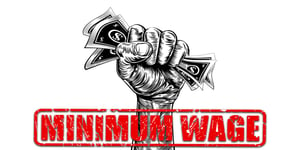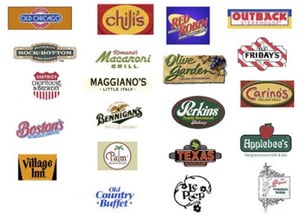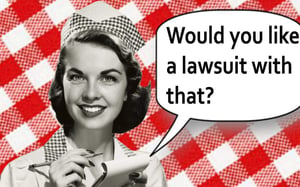All businesses, regardless of the industry, must have a comprehensive HR policy in place. This is as crucial in the restaurant industry as it is for a large corporation such as Walmart. Failure to address all the aspects of the HR process can potentially make your restaurant susceptible to a variety of legal and financial liabilities.
Recently, Bar-i had the opportunity to collaborate with Wes Garnett at a local Denver restaurant that is a mutual client of ours. Wes is the President/CEO of W. Garnett & Associates, Inc., a human resource consulting firm that assists a wide range of businesses with all of their HR needs. Wes has more than 45 years of experience providing HR services, including 30 years in corporate America and over 15 years running his own HR company. During this time, he’s provided HR services to a variety of small local restaurants and has held senior level HR positions at the following restaurant franchises:
- Buca di Beppo
- Black-eyed Pea
- Taco John’s
- Steak & Ale Restaurant Corporation
- DenAmerica Corporation, where he ran HR for over 350 Denny’s franchises
- Burger King
- Red Robin Gourmet Burger
- Bennigan's
This extensive experience provides Wes with a wealth of knowledge regarding the important HR practices that must be addressed by all bars and restaurants. We recently sat down with Wes to discuss the important HR pitfalls to avoid with your restaurant. Failure to address these items can result in costly penalties that can potentially derail your business.
Balancing State vs. Federal HR Regulations
It’s important to understand that your industry isn’t the driver of your HR requirements. Instead, the number of employees you have will determine which federal and state regulations you must comply with. If you’re not sure how the size of your restaurant impacts these HR requirements, you should consult an experienced third-party HR professional who can help ensure you are adhering to the proper regulations.
 In certain instances, state regulations will always supersede federal requirements. For example, you must always follow the minimum wage laws established by your state. Currently, federal law sets the minimum wage at $7.25/hour; however, many states have established different laws which raise the minimum wage higher than is dictated by the federal standard. In addition, many states have established different minimum wage standards for tipped employees. Understanding these laws is especially important for bars and restaurants, since the majority of employees in the restaurant industry would qualify for the reduced minimum wage for tipped employees.
In certain instances, state regulations will always supersede federal requirements. For example, you must always follow the minimum wage laws established by your state. Currently, federal law sets the minimum wage at $7.25/hour; however, many states have established different laws which raise the minimum wage higher than is dictated by the federal standard. In addition, many states have established different minimum wage standards for tipped employees. Understanding these laws is especially important for bars and restaurants, since the majority of employees in the restaurant industry would qualify for the reduced minimum wage for tipped employees.
Setting Consistent HR Policies for Restaurant Franchises with Multi-State Locations
 Often, it can be challenging to set HR policies if you own a restaurant franchise with locations across multiple states. In these situations, understanding all of the state regulations impacting your business across each of your locations is crucial.
Often, it can be challenging to set HR policies if you own a restaurant franchise with locations across multiple states. In these situations, understanding all of the state regulations impacting your business across each of your locations is crucial.
Wes recommends adopting one uniform HR policy that governs all of your locations in order to eliminate the issues that arise when you try to keep the different regulations for each state straight. In order to ensure all of your locations are compliant with their specific state regulations, you should adopt an HR policy that adheres to the state laws that are most favorable to the employee. By adhering to these regulations throughout all of your locations, you will be able to internalize one set of policies that will make each franchise location compliant with all applicable state and federal laws.
Running HR In-House vs. Working with a Third-Party HR Professional
If you only have one supervisor for all of your employees, you can generally keep your HR operations in-house. However, if you have multiple supervisors providing direction to employees, there becomes a greater risk that the direction from each supervisor will be inconsistent. To eliminate this risk, Wes recommends that you work with a third-party HR professional.
In general, if you have an establishment with over ten employees, it is helpful to have a relationship with a third-party HR professional who can advise you regarding best practices. This HR professional doesn’t necessarily have to work on site. Often, many of the HR services you need can be handled remotely, including:
- Payroll process
- Benefits
- HR support
- Workers’ comp
Establishing an Effective Harassment Policy
Failure to establish an effective harassment policy is a common HR pitfall that many bars and restaurants struggle with. There are a lot of factors unique to the restaurant industry which create an environment where harassment can occur, even in subtle ways. These include:
- Confined work environment
- Long hours
- Highly social work environment
- Alcohol consumption by employees in their work environment
 While harassment most commonly results from one person acting towards another in a way that makes the second person feel uncomfortable, there are other ways in which harassment can arise in the restaurant industry. Often, the way two employees interact in the work environment may make some of their coworkers feel uncomfortable. This dynamic can become acceptable to management without the realization that other coworkers may feel uncomfortable by the behavior being exhibited by these two employees.
While harassment most commonly results from one person acting towards another in a way that makes the second person feel uncomfortable, there are other ways in which harassment can arise in the restaurant industry. Often, the way two employees interact in the work environment may make some of their coworkers feel uncomfortable. This dynamic can become acceptable to management without the realization that other coworkers may feel uncomfortable by the behavior being exhibited by these two employees.
There are two ways to avoid these harassment pitfalls:
- Have an HR presence in the work environment in order to give employees an outlet to voice concerns in a safe way that can then be communicated back to management so that the problem is addressed in the most effective way.
- If you don’t have the resources to have an on-site HR presence, you can still establish a clear harassment policy and implement regular training to make sure all staff members understand the policy.
Wes recommends holding Title VII compliance training at least once a year. Title VII covers the following issues:
- Harassment
- Discrimination
- Wrongful discharge
- Retaliation
As part of your Title VII compliance training, all employees should be educated on the actions they can take if they feel like they have been a victim of any of the issues listed above. You can hold one large annual training covering all four of these items, or you can hold a quarterly training focusing on one of these issues. Choosing the quarterly training option is an effective way to ensure your staff is regularly receiving this important education.
Establishing a Safe Working Environment
 Throughout his career, Wes has seen that OHSA training is generally lacking throughout the restaurant industry. This inadequate training increases the risk for common restaurant workplace injuries such as slips, falls, cuts and back injuries.
Throughout his career, Wes has seen that OHSA training is generally lacking throughout the restaurant industry. This inadequate training increases the risk for common restaurant workplace injuries such as slips, falls, cuts and back injuries.
The following tips can help you maintain a safe work environment that reduces the risk of these common workplace injuries:
- Arrange the kitchen and storage areas in a way that ensures heavy items are stored no higher than waist level. This will significantly reduce the risk of back injuries.
- Provide all new employees with training on the proper way to pick up heavy items in order to avoid back injuries.
- Provide special cutting gloves that will prevent fingers from being sliced accidentally.
- Train all new employees on the importance of cleaning as they go. This will improve workplace safety and create a more sanitary environment that reduces the risk of food-borne illness.
- Train employees on the importance of keeping work areas dry to eliminate slips and falls.
- Establish a policy where mats are cleaned every night to rinse off any grease or other items that can result in slips and falls.
- Require employees to wear slip-resistant shoes to reduce the risk of slips and falls. While wearing slip-resistant shoes is not a state or federal regulation, it is a best practices safety approach that should be adopted at all restaurants.
Avoiding Alcohol Serving Liability Issues
Serving alcohol is a huge money maker for bars and restaurants, but it also opens you up to serious liability issues. Depending on the unique circumstances involved, your establishment may potentially be held liable for problems that arise due to overserving customers. In addition, there are serious penalties associated with serving alcohol to minors. It’s crucial that your staff receive the proper training to avoid these serious liability issues.
The following training should be provided to all employees to reduce the risk of alcohol-related liability issues:
- All employees must complete all state-mandated training required for alcohol service. In Colorado, all employees must maintain current TIPS certification. In other states, there are similar certifications which must be maintained.
- Provide proper training on checking IDs to all bartenders, servers, door staff and any other employees who may be required to check a customer’s ID.
- Train all servers and bar staff to look out for overserving and provide techniques for how to assist customers who seem like they are on the cusp of being overserved. This may include cutting off customers who are overly intoxicated or providing them with non-alcoholic beverage options.
- Stress the importance of cutting off customers who seem too intoxicated, regardless of how many drinks they have been served. Often, these customers may have only been served one or two drinks at your bar, but they may have been drinking heavily at other establishments before your staff served them.
- Instruct your staff to call a cab for customers who become too intoxicated.
 Overserving customers and serving minors aren’t the only alcohol-related liability issues you must address. Staff members drinking on the job poses a serious liability to your business and is not recommended under any circumstances. While this is a common practice at many bars and restaurants, the potential consequences for lenient staff drinking policies simply aren’t worth the risk.
Overserving customers and serving minors aren’t the only alcohol-related liability issues you must address. Staff members drinking on the job poses a serious liability to your business and is not recommended under any circumstances. While this is a common practice at many bars and restaurants, the potential consequences for lenient staff drinking policies simply aren’t worth the risk.
There are several reasons why you should never allow your staff to drink during a shift:
- Different employees have different tolerance levels. One employee may be able to perform their job perfectly fine after three or four drinks, while another may be unable to work after one or two drinks. This makes it impossible to establish a set number of drinks that would be considered appropriate for all employees to consume during a shift.
- If you have an overserving problem and the employee serving the customer was intoxicated, it creates additional liability problems for your establishment. These may include a greater likelihood of losing your liquor license.
- Workplace injuries that occur when an employee is intoxicated can create additional liability for your establishment if drinking on the job is condoned or accepted.
- Often, different managers may enforce drinking policies during a shift differently, and this will create problems. It’s important that your policy of no drinking on shifts is clear and consistent from shift to shift and from manager to manager.
Consulting with an Experienced HR Professional can Help You Stay Compliant with all State and Federal Regulations
Even if you feel that you don’t need the ongoing services of a third-party HR professional, it is a good idea to schedule a one-time consultation with a professional who can audit your HR practices to tell you where you are complying with federal and state regulations as well as potential areas where you may face compliance-related liabilities. Due to the high staff turnover rate at most restaurants, it is beneficial to schedule this consultation annually.
Failure to maintain compliance with federal and state regulations can result in expensive fines. Consider the following examples:
- You may be fined up to $10,000 for all employees who don’t have an I-9 form filled out. You may also face fines for filling out the form improperly. Working with an HR professional makes sure these items are all completed properly.
- All employees must be classified properly. A common issue involves improperly classifying someone as an independent contractor. In order to be considered an independent contractor, the person must provide the same services to multiple businesses. If the person’s only source of employment is your establishment, they should not be considered an independent contractor. You can face expensive fines for improperly classifying employees as independent contractors due to the taxes that aren’t being paid when this misclassification occurs.
- If you abbreviate the date on an I-9 form when the full date is required, you can be fined $2,156 for each time the date is misrepresented on the form.
- The way you store your employee information is important too. I-9 forms should always be stored separately from the employee files. Wes has seen many instances where Justice Department audits have resulted in future OHSA investigations due to information that was found in employee files. This additional information wasn’t required to be provided along with the I-9 forms. Keeping these forms separate will eliminate the risk of additional OHSA violations that would never otherwise have been detected.
Scheduling an annual consultation with an HR professional provides you with a cheap insurance policy to prevent getting hit with expensive fines and penalties that may potentially jeopardize the long-term success of your business.


-1.png)